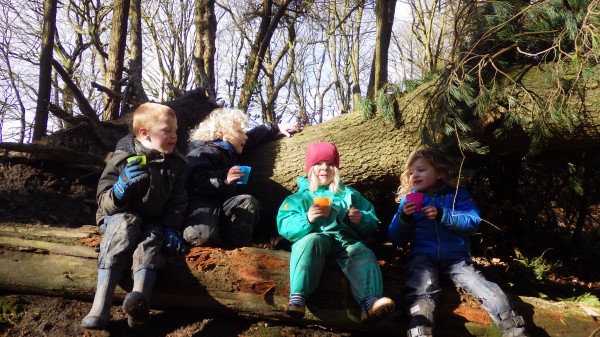 Lovely post from EarlyartsUK on The Wild Classroom - whys and hows and what it looks like and why, most of all, not to be afraid of the wilderness! Let's get more kids out there...
0 Comments
1/5/2011 One Small Step for Early Years, One Giant Leap for Children: a toolkit for creativity with young childrenRead NowThis time last year I was lucky enough to work with Isaacs UK and CAPE UK, exploring the work of artists and creative practitioners working with children and staff in ten early years settings across Leeds. They settings worked together as network, using Creative Partnerships' enquiry model of working to test out their activities. My role was to pull together everyone's learning, summarising shared findings and exceptional experiences, laying these out in a way which might be helpful for others looking for new and / or creative ways to unlock potential in their children. To round up a few of the ups and downs, things that worked, things that didn't work quite so much, and some of the thinking the creative and early years practitioners travelled through together or separately. At the heart of it all, to tell some of the stories of the children and how their outlook on the world changed a little as a result of the projects. On a more formal side, we looked at a couple of different ways of monitoring the progress of children - both in terms of the Foundation Stage areas, and in their wellbeing and involvement through a system known as EXE (Experiential Education). CAPE set some fantastic designers loose on the content I wrote with IsaacsUK, and the result is a really stunning and accessible looking publication. Please read, browse, enjoy and most importantly - pass it on to anyone who might make use of it. Browse or download it below, or online *here* As part of some research I'm doing for Earlyarts I came across this wonderful video which so beautifully and simply portrays everything that's good about children (and possibly everything that's missing with some types of education). For more inspiring input of this type, do come to or follow the Earlyarts international UnConference in November... 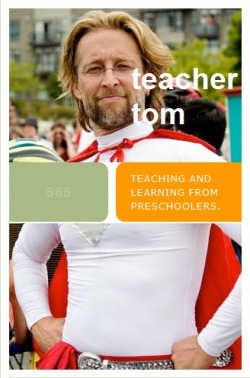 teacher tom. Who wouldn't love to arrive at a school where your teacher wears a cape? A teacher who says his blog is from the children? Who wouldn't love to send their child to a teacher who loves their job so much he says, "I intend to teach at <insert your school name here> for the rest of my life". A teacher who not only shares what your child has done, but why and how. Who makes learning looks like such good messy fun. Who can make anything out of anything and show you how to do it too. At a time when the future for creative learning in the UK looks quite depressing, it gives me hope to read what people like teacher tom are doing, it makes me smile about what children can achieve in good hands. Imagine if all teachers were like teacher tom. Incidentally if you go to his blog and click on his profile, you'll see a list of other blogs teacher tom follows, many of which are equally wonderful. If you know of any other great teacher blogs, so share them in the comments below, I'd love to see more. In evaluation, looking at outcomes is vital. When you've invested in a project of course you'll need to know what was achieved and where there are still gaps. But it can be cumbersome reading mounds and mounds of text in a report. Charts, graphs and percentages can help clarify, but can still make for dull reading (and for some feel too much like maths homework).
To help busy partners to any project, finding a variety of ways to report on activity can make all the difference between people remembering what went well and being able to advocate the value of their work... or not. I've recently been creating a toolkit for early years practitioners looking at how creative engagement can help achieve new and unexpected results. Its aim is to be quickly digestible and highly practical. The toolkit is based on the activity of ten creative early years projects in schools and Children's Centres in the North of England. The projects were mapped against the Early Years Foundation Stage six areas of learning. To illustrate which of the EYFS outcomes the projects really brought to life, I used wordle to create this at a glance illustration. The larger the word, the more presence it had in the projects. You can see here Personal, Social and Emotional development was the strongest feature across the programme overall. It doesn't replace the need for writing other information in the report of course. However the teachers, children's centre staff and creative practitioners involved, and readers of the toolkit, can now instantly see where the projects thrived and what kinds of outcomes similar work might expect to achieve, so much more quickly and easily than deciphering a big chunk of writing or trying to analyse a graph. John Cleese talks about the structure of thinking, being creative, and writing. When I was pointed in the direction of this video it was just what I needed to help me focus on a report I'm writing. Take 5 minutes to watch it, it could save hours in the long run. There are some things I've thought it would be good to do for a long time, but it's never been part of my paid work to do them, and so they haven't got done. I'm noting them here as a reminder to myself and an invitation to anyone who is interested, to commission me to do them, and share them freely and publicly (or at least under creative commons) for the wider benefit of those who can use them:
1. A list of what managing, researching and evaluating many projects has taught me about partnership - what it does or doesn't mean, what it looks like, the different shapes it takes, the benefits, challenges, pitfalls, successes, opportunities and more 2. A top ten of findings / recommendations that arise in my evaluation work. Mostly around the process of managing projects - resources, processes, staffing, communication, planning, sustainability and legacy - those sorts of things. There are so many shared benefits and challenges I see time and time again, to the point it makes me sad that these things have to be learned afresh each time with publicly funded activity. Wouldn't it be better if we can do more learning from each other and move things on? 3. A portfolio of what creative consultation / creative evaluation can look like - examples of things I've tried myself and examples that other people have developed in their work. There might be more to this list of lists but these are the freshest in my mind just now. So if you can't afford a specialist consultant for these things, do keep popping back, maybe one day someone will have commissioned them from me and they will be available to you for free. 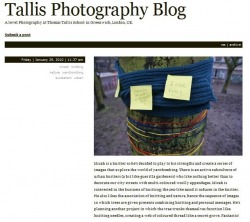 "Micah is a knitter" That was about all we knew from the tweet on creativetallis twitter stream but it was enough to hook me. CreativeTallis is a part of one extraordinary school's social media activity I've been following for some time now. Most schools now have something called a Virtual Learning Environment. It's a bit like an intranet but with some real web functions like blogging and podcasting. Personally I don't quite understand their purpose. If you want young people to experience the potential of broadcasting and publishing their work 'out there' then in my view the internet is the better way to do it. I appreciate schools have a responsbility for safety, which means many still sit behind resilient local authority firewalls with not much of the real world getting in or out. But if young people are going to access the web anyway in their own time, and they are, is it not more responsbile to help them understand how to do that safely, rather than pretend the world wide web isn't really there? And so CreativeTallis (actually Thomas Tallis school in London) is a leader in this approach for schools in my view. They present a range of websites, blogs, twitter streams, webcasts and more. In the past I've watched them create a 3D city-scape thorugh a live webcast, and been able via twitter, to ask them questions about what they were doing and why, and have students reply to my questions in real time. Through this kind of innovative approach, the school is able to demonstrate how students learn with a passion and excitement, stimulating curiosity and sharing, celebrating and exploring individuality. Importantly students are encouraged to help steer and develop their own learning, and have the know-how to recognise and reflect on their experiences. And so it is I knew that unusually, Micah is a knitter, would be the starting point to find out more about one student's experience of education. Micah is also a person, an individual, and knows how to celebrate that thanks to the realistic, practical, relevant, yet utterly 'out-there' work of his school. The DCSF recently released this guide to learning, playing and interacting in Early Years.
It's my belief that a huge amount of good practice in early years learning and development can be transfered to older age ranges and indeed other non-education work. The general premise of creative exploration as a means to find out and enjoy all the opportunities that are out there must be a effective approach for anybody. Jo Graham of Learning Unlimited, who has significant experience of working with early years development particularly in the South of England, and especially with museums, talks more about the values of the publication and how mow museums staff might use it in their thinking and planning... 4/12/2009 ICT / Digital Media Creative Practitioner wanted for cultural story telling primary school projectRead NowThe final project I'm publishing recruitment details for. A city centre Manchester school are looking for an inspiring creative practitioner to help them get to grips with ICT and new media through story telling of some of the many cultures present in their children's lives. Full details available to download below. Deadline: Monday 14th December
|
Details
...BlogI'm most interested in how the public, your public, whoever that may be, engages with culture and creativity.
And if it nurtures creativity and develops personal, social or professional skills I'm absolutely all ears. Categories
All
Archives
May 2023
|
||||||

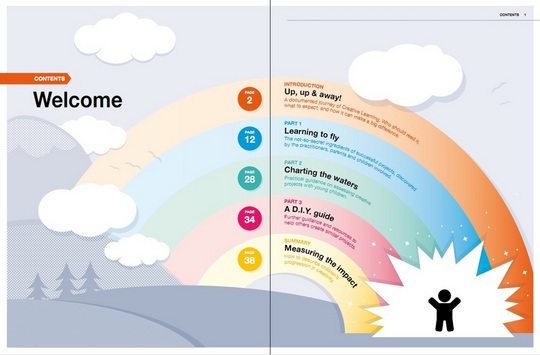
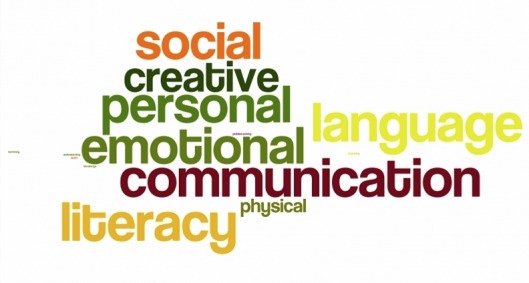
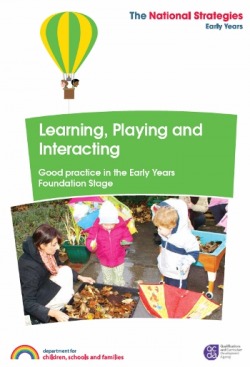

 RSS Feed
RSS Feed
